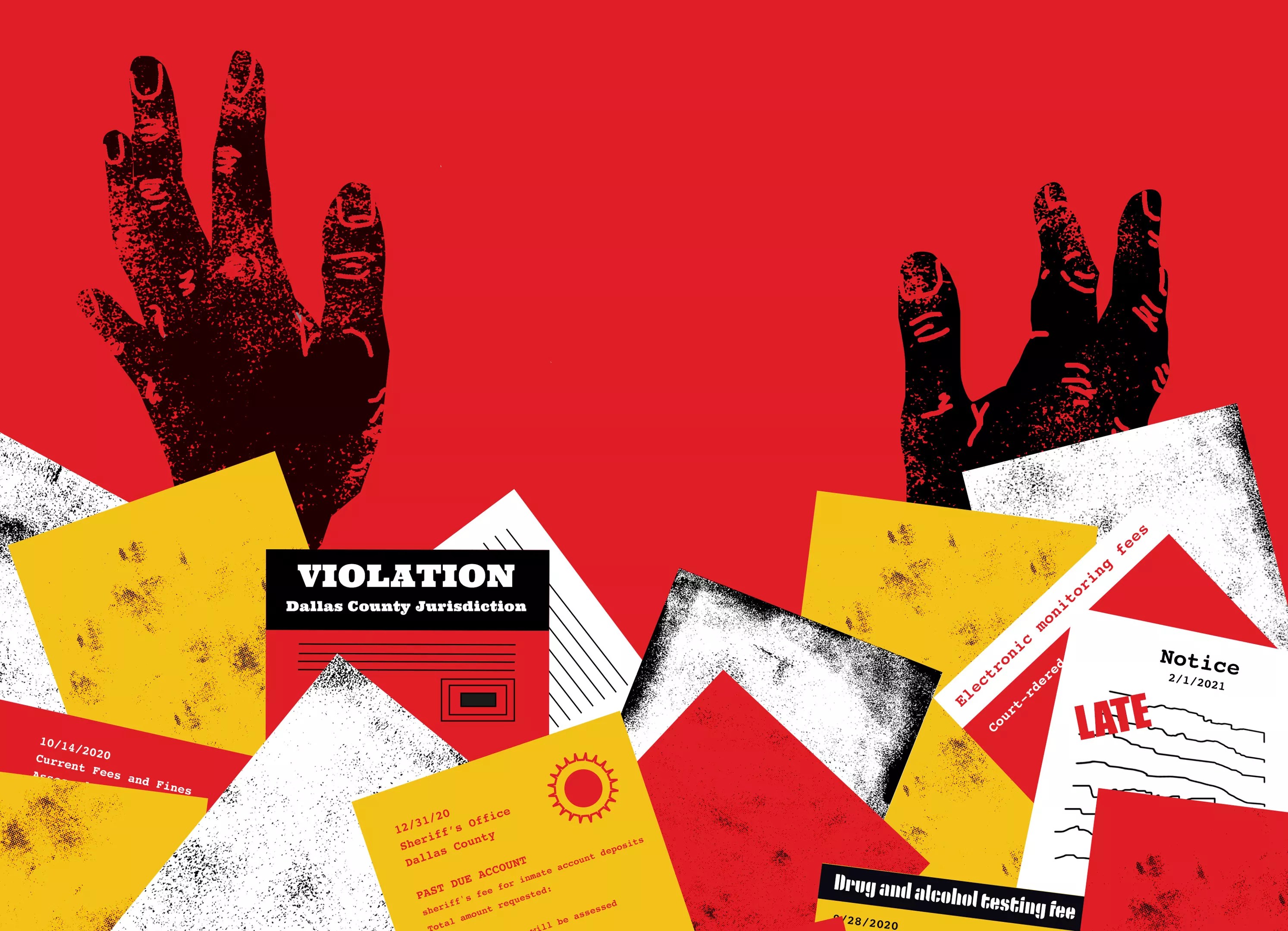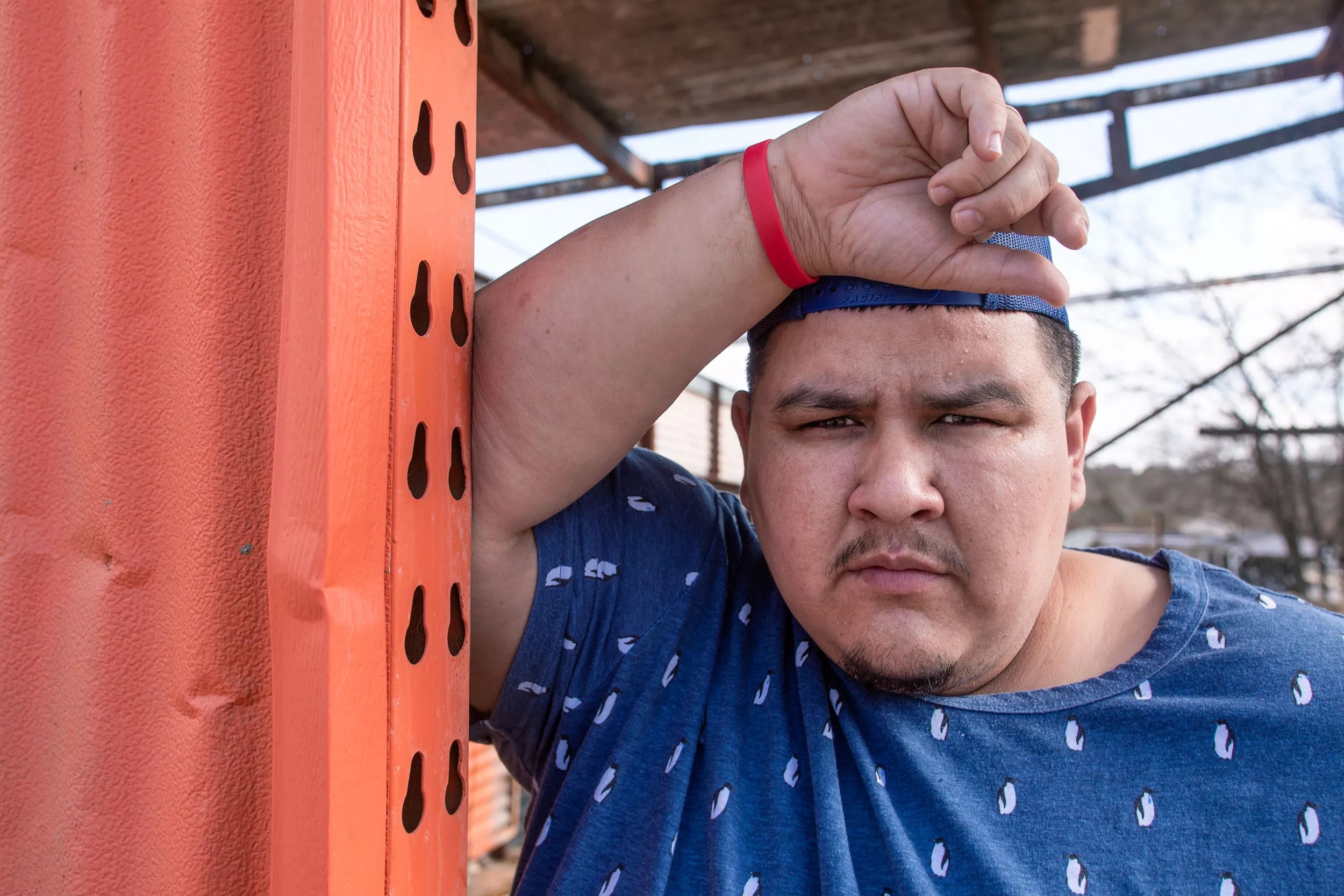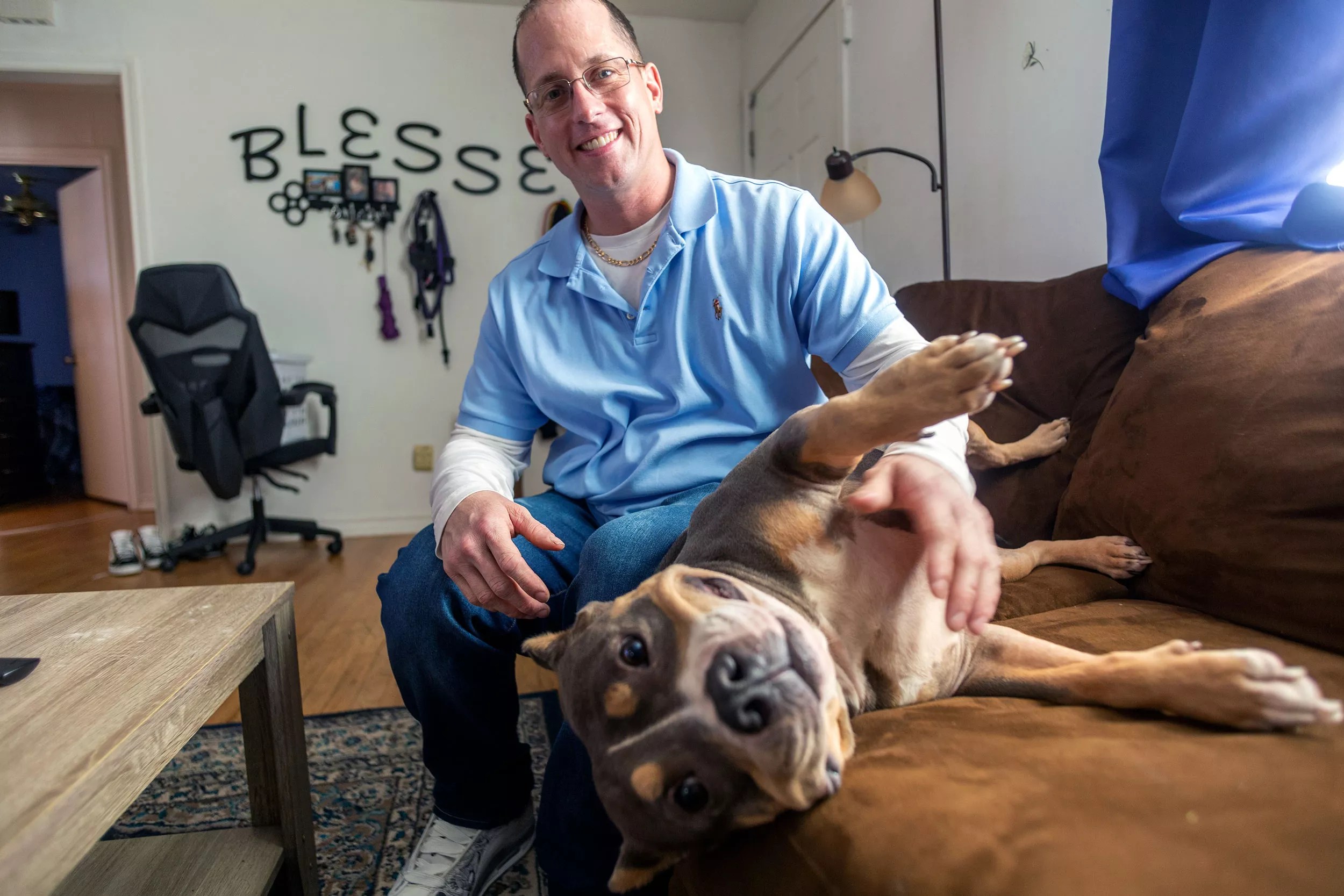
Sarah Schumacher

Audio By Carbonatix
Until life on the streets took him in, Jesus Monge says, he was a quiet kid who did well in school in Pleasant Grove and made friends easily. He remembers being an avid learner, bilingual in reading and writing. He won a few spelling bees, something he’s still proud of at 34.
Monge’s parents were immigrants. His mom worked two jobs and his dad was the silent, stoic type. Then, the summer before his freshman year of high school he was introduced to the Dallas gang Eastside Homeboys. A friend’s older brother was a member, and while Monge and his friend were too young to know much, they were old enough to recognize the respect the gang’s leaders received.
“After that, I was just focused on the streets. We were so bad in high school, the teachers would eventually always just give up. I don’t blame them. Honestly, I’m not mad,” he says with a light laugh.
His tone drops a note when he thinks about lost opportunities in his community. “But, we lack information as far as what we can do. You’re trying to teach me what an atom is, but what’s a mortgage? If I had essential life skills, I might know a little more now.”
He eventually learned those skills, but it was a long, hard path.
Monge was 19 the first time he was arrested for home burglary, a second-degree felony. A repeat offense while on probation landed him in prison in Huntsville for two years. Inside, he joined another gang in a survival response. Once out, just 21 years old, he soon returned to his old ways. The arrests racked up: unlawful possession of a firearm by a felon and aggravated assault with a deadly weapon. By 2011, he was back in prison, this time for seven years.
“Prison didn’t change my life, though. It was having opportunity. I wanted opportunity.” – former inmate Jesus Monge
“The second time around, after several years I was like, this isn’t gonna work. Then, I was recruited to the prisoner entrepreneurship program,” Monge says.

Jesus Monge found a way out of prison through an entrepreneurship program.
Mark Graham
The prisoner entrepreneurship program (PEP) is a safety rope thrown out to inmates, an opportunity to turn the ship around, a light breeze towards atonement for those inclined to grab it.
Inmates, or “clients,” as they’re referred to once in the PEP, receive training in various skills, from basic business classes to welding and cabinetry. They study financial concepts such as the ins and outs of car loans and mortgages. Most important, they’re assigned mentors and get post-release support.
After he served his time, PEP was crucial to Monge’s success on the outside. He connected with the Cornbread Hustle, a Dallas nonprofit staffing agency for “second chances” founded by Cheri Garcia, who became a crucial mentor for Monge. She funneled Monge opportunity. He eventually became operations manager for the nonprofit.
“I learned how to deliver pitches, present to companies,” he says. “I’m savvy. I figured it out. I can write, too, and I use that to tell my story. Prison didn’t change my life, though. It was having opportunity. I wanted opportunity.”
Since then, Monge has become an advocate for post-release programs and criminal justice reform through different organizations like the ReGen Hope Initiative. Despite his advocacy and professional strides after being incarcerated, he still faces challenges. Namely, threatening letters from the Dallas County District Clerk looking to collect on delinquent fines he received as part of his punishment.
“Right now, I owe five grand,” Monge says. “Let me tell you, they don’t play no games. They’re going to harass you. They threaten you with going back to jail.”
Monge was assessed a $1,000 fine for two arrests for burglary and $2,500 each for unlawful possession of a firearm and aggravated assault with a deadly weapon. He accepts that he owes and understands justice has to be served. He also knows all too well how easy it would be to take his friends’ offers to “set him back up.” But, with prison in the rearview mirror, he laughs off those offers; he’s done with that.
Still, that $5,000 bill and the threat of prison hang over Monge’s head. His story offers evidence that prison rehabilitation programs can help reduce Texas’ prison population and turn former prisoners in workers and taxpayers. It also highlights a challenge facing those who aim to reform Texas’ criminal justice system. The fines and fees handed to convicted criminals come from a complex system touching on courts, counties and state agencies, and are a lucrative source of revenue. They can also undermine the work of rehabilitation. Dallas County’s leaders know that’s a problem and have begun to search for a fix, but the path to reform also promises to be long and hard.
In meantime, ex-prisoners like Monge work to stay straight.
“But, the pressure of those costs. …” Monge pauses and sighs. “I already have pressure because I messed up my life and so many barriers exist because of that. And I’m threatened with more time if I don’t pay. That to me is the issue, because it makes those relationships oppressive and combative. It’s not rehabilitative, it’s punitive.”
Is he planning on calling the clerk who sent the letters to set up payments? “Honestly? No. I’m mad. I feel like I’ve paid my dues,” Monge says of his nine years in prison.
Is he worried they’ll arrest him on the spot if he appears in court to discuss the fines?
“Yep,” Monge says quickly. “And I don’t have time for that. It’s tough to explain that to your employer.”

Trey Laster also stayed out of the prison cycle through the entrepreneurship program and help from mentors, including Dallas Voice journalist David Taffet.
Mark Graham
Apologizing and Meaning It
Trey Laster was 14 the first time he was arrested by the Paris Police Department northeast of Dallas for selling cocaine. A year later, while on probation, he was busted for selling again, earning him his first stint in the Texas Youth Commission in Gainesville.
Before dealing drugs, Laster had been a good student, although his home life was unstable. His parents separated when he was 13, and his mother was a drug addict. One of his great regrets in life is their last conversation, more of a fight really, before she died from an overdose when he was 15.
He and his dad had a volatile relationship. Their fights were bitter and at times involved the police. He spent many of his teen years couch-surfing at friends’ homes and running from the police with little, if any, parental oversight. Arrests piled up after his time at Gainesville: possession, deadly conduct, evading arrest, DUI, aggravated robbery, terroristic threat, driving with a suspended license, driving with an invalid license, possession of a controlled substance, evading arrest, jumping bail and failure to appear.
“I woke up every day with no regard to the law whatsoever. I did exactly what I wanted to do,” Laster says now, matter-of-factly.
On Oct. 30, 2011, Laster was at a party in a barn just outside of Paris. “I served seven years of an eight-year sentence for 45 seconds,” Laster says of his final act before prison.
“Trey is completely the exception in that he apologized and meant it.” – journalist David Taffet
Laster’s friend was in a fight, “and of course, my dumb ass, I jump in. I took a hate crime enhancement for it,” he says. The victim was gay, and Laster called him a “faggot” during the fight, even though he says that’s not why he was involved in the fight. He pleaded guilty to aggravated assault with a deadly weapon (hands and feet) and “true” to the hate-crime allegation, which bumped the second-degree charge to a first-degree felony. He received an eight-year sentence.
While locked up for the first few years, Laster let the system, which he says “teaches violence,” get the best of him. He fought. He spent 23 hours a day in solitary confinement at times. But eventually, his mindset flipped. He was watching his young son, whom he had won full custody of before going to prison, grow up through letters. He realized that in order to give his son a decent life he had to make the best of his time in prison. “I decided to make it about rehabilitation, not punishment,” Laster says.
That’s how Laster met Monge, his mentor in the PEP. Both men say, “My boooooooy,” when the other is mentioned. Laster learned trades – cabinetry and welding. He also learned the finer points of interest rates, a valuable skill he used shortly after being released when he needed a car for work. The PEP offered an escape from the worst aspects of prison – the unit he was moved to had zero-tolerance for fighting – and provided him something to focus on.
In another part of his penance, he wrote David Taffet of Dallas’ Voice magazine, a Dallas LGBT newspaper and host of KNON radio’s “Lambda Weekly.” The hate-crime charge from the fight was one of the first instances of the law being applied in Texas, so the story grabbed regional and national attention. Taffet reported about the attack, and Laster wanted to share his side of the story.
“Not because I wanted to cry innocent, because I wasn’t. But, I was innocent of a hate crime. The picture the media painted of me was inaccurate,” Laster says.
Taffet drove to meet with Laster in person at the Ramsey Unit prison in Rosharon just south of Houston. With a thick slab of glass between them, Taffet listened to Laster for three hours in the first of many meetings, which eventually turned into a friendship. “Now he’s my mentor, my friend and a person I have great respect for,” Laster says.
Laster attributes much of his rehabilitation to Taffet; having someone outside of prison to talk to once a month was crucial. Taffet even wrote the Texas Board of Pardons and Parole to ask them to consider Laster’s case more thoroughly, an effort that resulted in his early release.
Laster served seven of the eight-year sentence and left prison with $50 in his pocket and the clothes on his back. No one back home in Paris had the means to help him, and he knew returning there would be going back to his old life. So, Taffet helped; he took him to get new eyeglasses and even gave him a ride to Paris to get his son.
“Trey is completely the exception in that he apologized and meant it,” Taffet says.
Laster settled into a halfway house in Dallas and got his first job tack welding six days after his release making $10.50 an hour. The halfway house was near Interstate 635 and Coit Road, but his job was miles south at Illinois and West Moreland.
“I didn’t have a car, so they gave me a DART pass. In order for me to get to the station on time, I had to get a bicycle to ride to the Forest Lane train station, and ride the train to the Westmoreland station, and then ride my bike the rest of the way to work. Then after work, do it all over again,” Laster says.
He didn’t mind. He expected life on the outside to be tough at first. He saved up $1,200 for a downpayment on a car through a program, OnTheRoadLending.org, that assists people experiencing hardships in buying a vehicle (a program he learned about through the PEP). With that payment, plus insurance, $100 a week for a room at the halfway house and life’s other incidentals, “my little check was gone,” Laster says with a laugh.

Journalist David Taffet became a conduit for Laster’s story and ultimately his rehabilitation.
Mark Graham
“That being said, though, to a person like me, what does that mean? I’m trying to keep my job, but I’ve got to get my parole paid, I’ve got these court costs. I can go sell weed and make that in a day, or even sell cocaine and make three times that. You start having these thoughts, and you get desperate,” Laster says.
He, fortunately, had a support system, including Taffet, mentors, his son and his now-fiancée who helped keep his head right. The car, parole and fees were a struggle, but he was able to squeak it out. In retrospect, however, he sees all too well the flaw in the system.
Laster points a finger in the air, punching the words through: “You don’t take people who committed crimes in a financial disparity and place them back in a financial disparity.”
Circular Thinking
County governments rely on fines and fees from the criminal justice system as a revenue stream, which is one of the biggest obstacles in reforming that system. Dallas County pulled in more than $20 million in fines and fees in 2018. While many Texans surely believe that those who earn their trip to prison should pay for their crimes and their days inside at state expense, the resulting financial burden contributes to a cycle of poverty, crime and recidivism.
The PFM Center for Justice and Safety Finance (CJSF) is a nonprofit that aims to help counties find ways to eliminate or reduce that financial reliance on fines and fees. Dallas, along with two other counties in the nation, was selected by CJSF for grant-funded financial assessment. In November, Sarah Schirmer, the deputy director at the CJSF, presented the findings to the Dallas County Commissioners Court.
“No one is benefiting from the current system,” Schirmer says in a phone interview. “The county brings in very little revenue, and there is little benefit to public safety. Clearly, we know it’s harming our communities. I think there’s a misunderstanding on the benefit of the current system.”
Fees, or court costs, are a revenue source but are not intended to be punitive, Schirmer said. Fees are also primarily set through the Legislature, which makes it almost impossible for the county to take a red marker and simply eliminate them.
“No one is benefiting from the current system.” – Sarah Schirmer, CJSF’s deputy director
There are around 90 possible fees assigned to any one court date in Dallas County: parole or probation fees, electronic monitoring, drug and alcohol testing fees. There’s a fee to participate in court-ordered programs, like anger-management classes. There’s a sheriff’s fee for inmate account deposits. There’s even a fee for paying a fee. Some fees go to third-party vendors, like for tests and monitoring devices. Monge’s first theft conviction had $561 in court fees.
In a step toward reform, the Dallas County commissioners recently successfully renegotiated the fee charged to inmates for phone calls. The vendor was collecting more than $4 million annually from families of incarcerated people, of which 60% went back to the county. Commissioners were willing to take a $2.4 million hit to the county’s bottom line to reduce their role in the cycle of poverty. The new contract set the rate at 1 cent per minute, the lowest in the country.
Fines, on the other hand, are punitive and determined by judges.
“Judges have significant discretion in assessing fines, and they have some discretion in assessing fees,” Schirmer said. “Dallas County really understands the significant impact this has on people’s lives, especially dealing with unemployment and potential evictions, so the county really does want to take action on this where they can.”
In 2019 in Dallas County, 65% of defendants in felony cases were assigned court-appointed lawyers because they couldn’t afford to pay for one themselves. The number was 55% in misdemeanor cases. Clearly, most defendants are poor.
In 2018 there were $10 million in outstanding fees in Dallas County (this doesn’t include parole fees). Schirmer told commissioners in November that each year that outstanding debt grows, creating not only a burden on those who owe but a cloud over the communities they live in as it incentives more crime. When weighing bills – rent, utilities, groceries, clothes or court fees – hopelessness sets in. Or indifference.
The Brennan Center Justice Program studied the financial impact of incarceration and found that “those who have been to prison will lose around half of their earning potential. Over the course of a lifetime, that loss, on average, approaches half a million dollars – easily the difference between escapable and inescapable poverty.”
Additionally, the report explains fees create new paths to prison for those unable to pay their debts and make it harder for ex-prisoners to find employment and housing and meet child support obligations. The Brennan Center notes the impact mostly affects Black and Latino communities, whose members are disproportionately incarcerated.
David Reyna is a Dallas criminal defense lawyer and a former assistant district attorney. He says that rarely do people go back to prison just for nonpayment on fees or fines, rather, they are usually arrested for a new offense or for failure to appear in court at hearings about their debts.
“I can understand why people would be scared [to appear at a hearing for nonpayment],” Reyna says. “But the county or state would rather work with people.”
For someone who spent nine years incarcerated, being in a courtroom with bailiffs who can put you in handcuffs and lead you back is daunting. And while the Texas Constitution is clear, “No person shall ever be imprisoned for debt,” Bo Kalabus, a North Texas defense attorney, explains that fines aren’t a debt. They’re punitive. “Fines are a contract. Think of it like child support. And that’s how counties are able to enforce it,” Kalabus says.
Long Haul
CJSF proposed Dallas County focus on reducing prisoner length of stay, which could produce savings of up to $12 million annually. The county far exceeds the standards set by the National Center for State Court (NCSC) in getting misdemeanor cases and felony cases disposed, and indigent defendants are unlikely to be able to afford bail while awaiting trial, leaving them to sit in jail at the county’s expense. The NCSC recommends that 90% of misdemeanor cases reach disposition within 90 days and 98% of felony cases in 365 days. In 2019, Dallas County took longer than 90 days in 66% of misdemeanor cases and longer than 365 days in 29% of felony cases.
Simply moving inmates in and out of the system more efficiently alone can reduce the costs to the county.
Another option is to stop spending money collecting fees. In 2018, the District Clerk’s Office, Dallas County’s collections arm, spent $1.6 million to collect $6.2 million, a cost that has steadily risen since 2015. Merging and reassigning personnel overseeing these duties could save another $325,000 annually.
As far as ways to reduce fines, CJSF suggests county leadership collaborate with judges who issue them. Improvements in data reporting and the creation of a sliding scale based on an individual’s ability to pay, plus consideration for the severity of crime, could help reduce the long-term barriers fines create.
Parlaying these policies with Dallas County District Attorney John Creuzot’s recent sentencing reforms, which include not prosecuting misdemeanor marijuana cases for first-time offenders, cases involving trace amounts of drugs, driving with a suspended license or theft of basic necessities such as diapers, would catapult Dallas to center stage of criminal justice reform.
At the November meeting, County Commissioner John Wiley Price said he’s worked at length in changing this system from the inside out, but it requires collaboration with the state Legislature, which has so far been a futile effort.
“A fine isn’t a fine unless it’s paid.” – Dallas County District Clerk John Warren
Dallas County Clerk John Warren said the study is a good template, but it will require several years and immense collaboration. Still, he emphasized this is Dallas County’s opportunity to take the lead in criminal justice reform.
“It would be more of a three-year transition to reduce or eliminate court costs altogether,” Warren told the commissioners. “The court cost part would have to happen through the Legislature. But, the criminal court judges have the authority to dictate how much of a fine to produce.”
The National Associations of Counties released a report based on the CJSH study and applauds Dallas County’s willingness to deal with the effect fines and fees have on both public safety and former prisoners. They write that the county could serve as a “blueprint for what counties can do to achieve a fairer and more equitable criminal justice system.”
Commissioner Dr. Elba Garcia asked Warren if the reform is really possible.
It won’t be easy, Warren said, but “if we can put all the pieces on the table and analyze what’s falling off,” over several years he’s confident that this level of criminal justice reform is attainable.
Fine Talk
Three years after being released, Laster recently landed a new job after having been turned down multiple times because of his background. When he got the call, he was almost in tears. “I can take care of my family with that money,” he says, referring to his son and fiancée with whom he shares a home. They’re planning an April wedding.
Monge has an electric sky-is-the-limit energy when he talks about his new job. In 10 years, he says he hopes to be the “COO of companies.” Yes, plural.
But he still doesn’t know what he’s going to do about the $5,000 he owes. He’s downright obstinate about contacting the clerk’s office; combative letters give no indication they’re willing to work with him, and he isn’t sure what his rights are and what the county can and can’t do.
Despite his support of criminal justice reform at the presentation, when asked about it in a follow-up phone call Warren said, “A fine isn’t a fine unless it’s paid.”
A month later, in an email just prior to publication, Warren said no progress has been made in addressing a shift on the reliance on revenue. The pandemic and the outset of the legislative session could work as speed bumps in the short-term.
Or it’s all just talk.